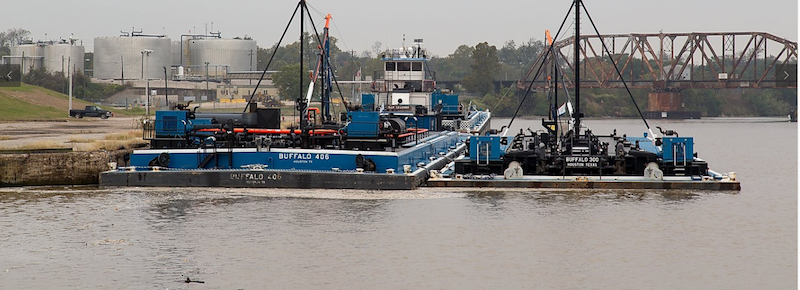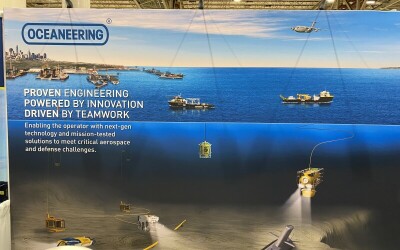The inland waterways industry has joined other businesses across the U.S. in seeking liability protection from pandemic-related lawsuits that are filed on behalf of workers who claim they have been sickened or died from exposure to Covid-19 while on the job.
The American Waterways Operators, which represents barge, towboat and tugboat operators, wants Congress to enact “targeted liability protections” for maritime employers who make “good faith efforts to abide by applicable public health guidelines in working to protect their employees from exposure to Covid-19,” Jennifer Carpenter, AWO’s president and CEO told a congressional subcommittee hearing recently.
She said the protections would be temporary and would still allow lawsuits against employers who “engage in reckless or willful misconduct.”
AWO is among a long list of industries — including frontline healthcare workers, dentists, bankers, hotel workers, drug companies and also Congressional Republicans — that want the liability shield to be included in the next coronavirus emergency bill that Congress is considering. Regardless of precautions taken to keep employees and customers safe, these businesses are worried about being hit with frivolous lawsuits as they reopen their businesses. Several states have implemented safe harbor protections, but these advocates want action on the national level.
Opposition comes from Congressional Democrats and labor unions. They argue that businesses are doing little to protect vulnerable workers and liability protections will embolden reckless behavior. They also say that strong liability laws provide confidence to the public and consumers about business accountability.
Carpenter said AWO became concerned about the possibility of lawsuits in mid-March when several barge companies in Texas noticed advertisements from trial lawyers seeking to represent workers in Covid-19-related cases. “We don’t want to be at the mercy of trial lawyers who see this as an opportunity to get their hooks into companies just as we’re trying to get a recovery going,” she said.
As the issue became more pressing nationally and Congress began to look at it, Carpenter said AWO wanted the barge industry to be included in any new legislation, or at least not be harmed by it.
“We’re not seeking a wholesale rewrite of maritime liability law,” she said in an interview. “We want to make sure any broader industry fix also works for the maritime industry because we operate under specific statues and have some unique liability schemes.”
Frivolous lawsuits could be extremely costly, she added, especially at a time when the barge industry, which is considered an essential industry, has heavily invested in protections and protocols to make their workplaces safe, and when barging has suffered from a drop in demand due to the global economic slowdown.
Litigation should be limited to cases in which the employer can be shown to be reckless and should have known better. “We’re not looking in any way to let off the hook unscrupulous or reckless behavior if that’s out there,” Carpenter said, because in that case the mariner needs legal recourse. “We’re also not looking to make a permanent change to maritime law. This is specific only to Covid-19.”
Inland operators are closely watching a case in New Orleans that will test the legal obligations of Jones Act vessel owners, as well as their pandemic safety policies and responses to confirmed or suspected Covid-19 infections.
A federal court in New Orleans is considering a wrongful death lawsuit filed by the widow of a deceased deckhand, Michael Norwood, who worked on a Jones Act supply vessel out of Mobile, Ala., in March. It alleges that Norwood contracted Covid-19 from the vessel captain who had returned to Mobile after a work assignment in New Orleans, fell ill and self-isolated in his cabin for several days until the company was informed of his illness. The company removed the captain from the vessel and he tested positive for Covid-19. The deckhand returned home and was isolating from contact with others when he became sick and died.
The lawsuit blames Rodi Marine, the vessel owner, for failing to provide a safe workplace, not implementing policies to protect the crew, not training crews on how to prevent infection, allowing the captain to travel to New Orleans even though the city was on lockdown, and not immediately evacuating the ill captain from the vessel to prevent exposure to the crew, wrote Grady Hurley, a partner at Jones Walker, in a May 19 National Law Review article.
The deckhand’s widow evoked two maritime laws in her suit. She alleged wrongful death and survival action under the Jones Act, and unseaworthiness under the General Maritime Law, asserting that the vessel owner had the duty to provide a seaworthy vessel and a “fit” crew. It is alleged that “the captain was not fit because of his illness, and the vessel was not fit because of Covid-19 contamination upon the captain’s return,” Hurley wrote. A Jones Act seaman must show that the unseaworthy conditions of the vessel played a substantial role in an injury, or that the injury was either a direct or probable consequence of the unseaworthiness.
Asked if inland companies might began requesting that employees sign waivers stating they won’t sue if they get Covid-19, as is happening in many other industries, AWO’s Carpenter said: “I’ve not heard anything of that sort. What we’ve seen in our industry is a very effective partnership where mariners have taken their status as essential workers seriously and want to be safe and keep working. And employers have put all kinds of measures in place from enhanced cleaning to social distancing, while the Coast Guard has been cooperative. So, everyone has been trying to make it work.”





